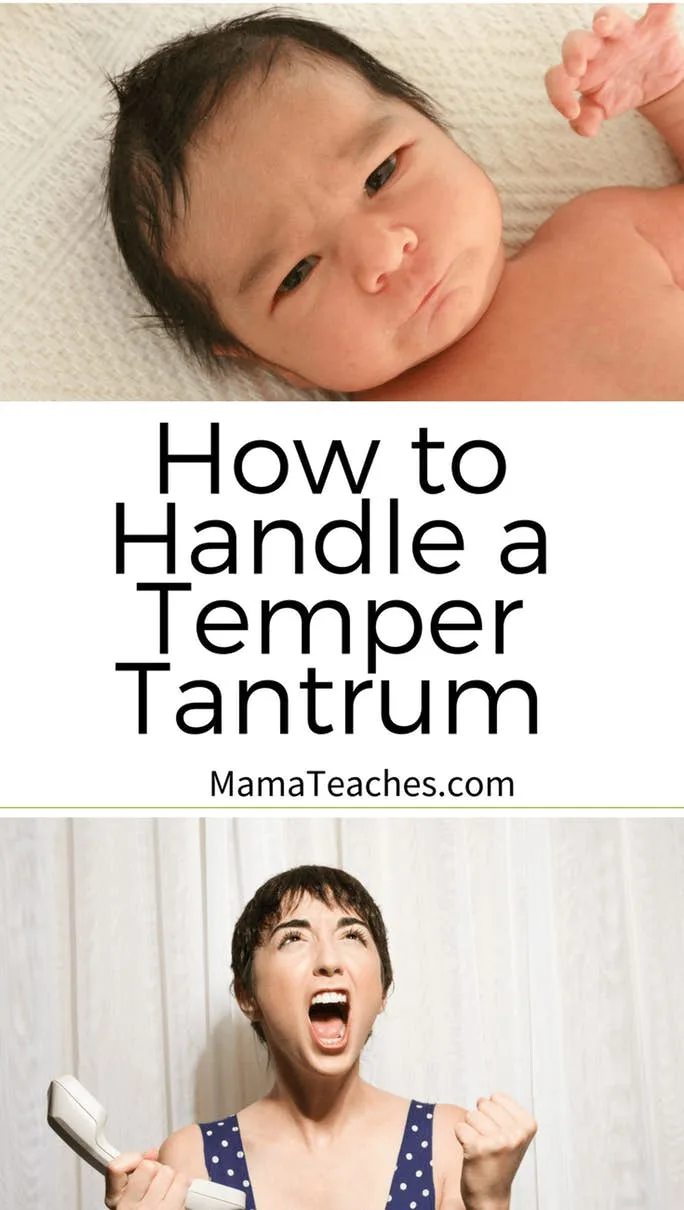
This article contains affiliate links to things that you might like.
Buckle him into the cart, give him his favorite book to “read” and away we went toward the produce aisle.
I’d say we were there for about 20 seconds when I realized something was off.
Maybe it was the way he was kicking his legs or the grimace on his face that gave it away.
But at 21 seconds?
All h-e-double hockey sticks broke loose and we were in full on temper tantrum mode.
It was mortifying.
It was frustrating.
And I thought his behavior was a direct reflection on me.
You see, no one ever tells you how to handle a temper tantrum or how to feel when your 15-month old is going bananas next to the kale.
Maybe you’re reading this and preparing yourself.
Or maybe you just got home from the store (that you’re determined never to set foot into again) where your child threw a temper tantrum and you’re looking for hope.
Let me reassure you, the temper tantrum phase will pass.
Until then, let me share some information so that you can get through it too!
How to Handle a Temper Tantrum
Every parent has or will experience a temper tantrum at some point from their child.
Generally, tantrums are most common between the ages of one and four for both boys and girls.
Tantrums run their course for about thirty seconds to two minutes, give or take.
This is your child’s way of expressing his or her frustration or anger.
Although temper tantrums are very unpleasant for parents (duh!), there are several ways to recognize and handle these situations.
TRIGGERS
Triggers are what can set your child off into a tantrum.
Wanting attention, being tired, hungry, or uncomfortable are the most common causes.
My son would always have full-blown hangry (hungry-angry) tantrums right before dinner.
I learned to keep a supply of fishies on hand for those moments!
In addition, when a child wants to test his limits or explore his independence, not allowing them to do so can result in a tantrum.
DURING A TANTRUM
Temper tantrums are frequently associated with the following:
- screaming
- crying
- hitting
- kicking
- biting
- arguing
- and breath holding
During a tantrum, it is best stay calm.
Getting worked up about your child’s behavior could result in a power struggle between the two of you and cause the tantrum to be magnified.
Try to establish what the trigger was and then try to understand it from your child’s point of view.
If the tantrum gets physical, gently hold or restrain your child – letting him know that you will let go when he calms down.
If your child is older, send them to their room until they are composed.
If you’re out in public when a tantrum begins, try to distract your child or remove them from the current environment by taking them outside or to the car.

PREVENTION
By learning what sets your child off, sometimes, preventing a tantrum is possible.
Make sure they get enough sleep and are well rested, as tiredness is a common trigger.
Be sure to teach them calming strategies for kids; even little ones can learn to breathe in a way that will relax them.
A mindfulness calm down jar can also work wonders if you catch the tantrum in time!
Reward your child for positive behaviors, helping them identify appropriate ways to express themselves.
With certain things that are expected of your child, like eating breakfast, tell them to do it rather than ask.
Offering them choices to make, such as pancakes or cereal, will give them a sense of control.
Making yourself aware of what your child’s limits are and what triggers them to have a tantrum, can be what prevents the next one from happening.
AFTER A TANTRUM
After a tantrum, talk to your child and find out what caused them to behave in a certain unacceptable way.
Use this information to teach them better ways of handling their feelings or expressing their needs.
It’s possible that tantrums can escalate by becoming more frequent or the child putting themselves or others in danger.
Should this happen, it might be time to call a professional.
A doctor can help you and your child deal with these tantrums together.
Hang in there, mama!
Things will get better!
